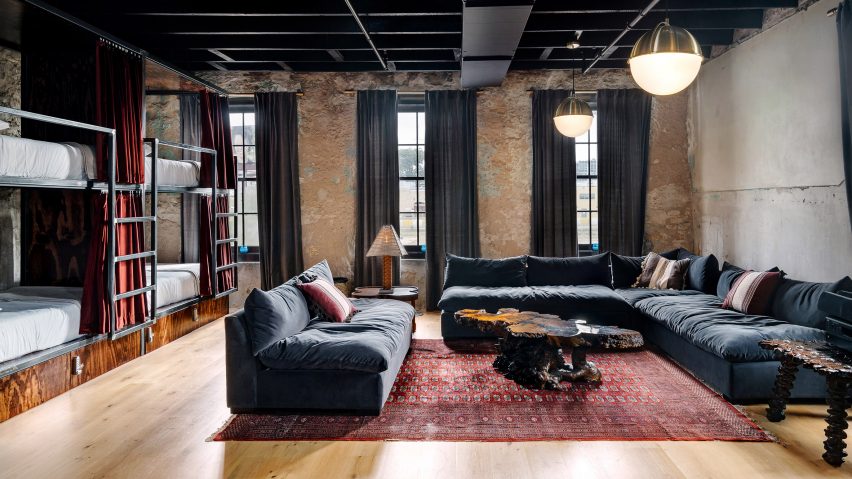American firm Un.Box Studio has transformed historic structures in Austin into a high-design hostel that is meant to serve as an alternative to pricey boutique hotels.
Located near the city's Downtown district, the Native Hostel and Bar & Kitchen occupy a two-storey stone building dating to the 1890s and a brick warehouse that was added in the 1940s. The site originally housed a brewery, and later, a series of shops and factories.
Given the lack of historic buildings still standing in Austin, the property was highly sought-after when the owners purchased it several years ago, despite its dilapidated condition.
Much of the building was neglected or covered over with plaster, gypsum ceiling panels, sheetrock and carpet.
"We wanted to pull back these layers and expose the original building and some of its history," said Un.Box Studio, an Austin firm started in 2010 by Jared Haas.
Encompassing 18,619 square feet (1,730 square metres), the new venue contains an "experiential hostel" with a variety of sleeping quarters, a restaurant, a bar and an event space.
With guest beds starting at $49 (£38) per night, the hostel is meant to serve as a stylish yet affordable alternative to the pricey boutique hotels popping up in Austin.
"Affordability is the hottest topic in Austin at the moment," the firm said, noting that the Texas city has undergone rapid growth in recent years.
While conceiving the project, the design team set out to re-define the American hostel – typically viewed as cheap, no-frills lodging with zero character.
"The term 'hostel' has an extremely negative connotation in the US, and the owners and I sought to change that perception," Haas said.
"We didn't just want a place to stay, but a place to hang out, for both travellers and locals alike. We wanted a place that had a culture."
In total, the hostel offers 65 beds spread across 12 rooms, including the ultra-communal Romper Room, which has eight bunkbeds and a king bed.
"A space limited solely by our imagination, the Romper Room is a place for free play and privacy," the hostel states on its website.
The hostel often hosts live music acts, movie screenings and art events — which all lend to the venue's "Fuck Yes" culture, as described by the owners and reinforced by the building's distinctive appearance.
On the exterior, the firm retained the textured stone facade and added a shade-providing canopy made of steel and corrugated metal.
The warehouse was painted navy blue, and a bold mural featuring a bull's skull – a common symbol in the American West – was added to one side.
Inside, certain areas were left untouched and exposed, such as those with historic etching and stencilling. The firm saw these as important relics that help tell the building's story. Structural elements were also preserved.
"The adage that 'they don't build them like they used to" is an understatement in this scenario," the studio said. "The fully exposed stone, brick, wood and steel structure are rare and beautiful."
New elements were added where needed. Custom steel doors and windows were installed, and several interior walls were covered in burnished stucco or tile.
Un.Box Studio worked closely with Austin-based Joel Mozersky Design to create the interior atmosphere, which is meant to feel "dark and stormy".
Rooms are fitted with an eclectic mix of decor. "Overall we wanted to preserve the history but create something culturally conducive for the current and future generations," the team said.
A lounge area features leather seating, patterned rugs and gilded mirrors. In the cafe, the team installed deep blue banquettes, wooden tables and black industrial-style lighting fixtures.
Dorm rooms contain hand-crafted bunk beds made of steel and stained plywood panels. Each has a privacy curtain and a lamp.
"We were trying to balance out more authentic and traditional materials and ideas with modern construction and concepts," said Un.Box Studio, which has previously completed a compact waterfront cottage in Austin made of low-maintenance materials.
"By merging all periods and styles, we feel that we have created something that is timeless."
Photography is by Chase Daniel.
Project credits:
Architectural design: Un.Box Studio
Interior design: Joel Mozersky Design
Branding: Helms Workshop

